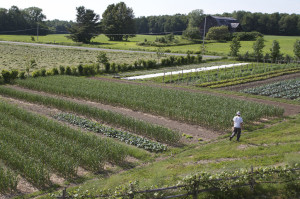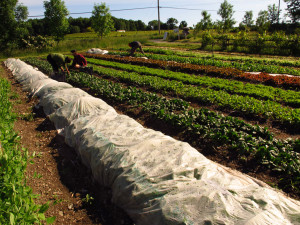 The first piece of swag to come out of writing this blog hit my mailbox this spring, when I was asked to review Jean-Martin Fortier’s book The Market Gardener. Sadly, they did not also send me a broadfork.
The first piece of swag to come out of writing this blog hit my mailbox this spring, when I was asked to review Jean-Martin Fortier’s book The Market Gardener. Sadly, they did not also send me a broadfork.
Carmen and I were also able to enjoy a one-day workshop with Jean-Martin, put on by the Young Agrarians as part of the Rockstar Farmer Tour—and we even drank a beer with him afterwards. So, I got the inside scoop for you.
In short, if you have dreams of serious gardening or small farming, buy this book. Beyond that, the big question for me was why would I buy this over the Coleman classic, The New Organic Grower? I think you should buy both, but I think you should read Jean-Martin first.
I will go into more detail, but Jean-Martin makes starting a profitable small farm (grossing over $100,000 from 1.5 acres) seem possible. I could identify with him in a way I can’t with the Grand Old Silverback Coleman; Jean-Martin and his wife Maude-Hélène are young; they didn’t start with a lot of money; they live in Quebec, which is noted for winter; they have chosen a farming system based on hand tools to avoid the expense of tractors.
To explain why I think you should have The Market Gardener near to hand, I need to talk about Eliot Coleman, the Guru of modern smallholdings. Fortier is an admirer and student of Coleman, the two of them have gone on speaking tours together—their philosophies are very complementary. Coleman is a researcher, an inventor and a philosopher. He tells you what he knows, what he thinks and what he doesn’t know. He does not skimp on detail—his books are thick and packed with information.
And for me, trying to garden a few urban plots and imagine a more agrarian future, Coleman is overwhelming. There is so much detail I drown. Coleman also uses a folksy illustration style I find obscures the information—this really stands out, for example, in his discussion of crop rotation.
 Jean-Martin has cut to the chase and tried to produce a handbook, a plan for the new small farmer to follow. He is more detailed about budgets and costs, and yet presents topics like crop rotation in a more simple way—a way I was able to apply in my own garden this year.
Jean-Martin has cut to the chase and tried to produce a handbook, a plan for the new small farmer to follow. He is more detailed about budgets and costs, and yet presents topics like crop rotation in a more simple way—a way I was able to apply in my own garden this year.
Fortier, like Coleman, is very aggressive about weeding out inefficiency—even if a little Coleman goes with it. The New Organic Gardener strongly promotes soil blocks. Fortier says, in his charming French way, that soil blocks are too much work, and they get perfectly good results with standard seedling cell trays.
Coleman is great—he is much more detailed on soil amendments. He also includes more history and philosophy. Coleman is a popularizer of winter gardening—whereas the Fortier family simply plans to take time off in the winter and go to sunny places.
It is comforting to me to have Jean-Martin demonstrate successful and profitable farming with different methods than Coleman. It makes me feel like any small variance on my path might not necessarily result in a disastrous garden failure. Fortier proves what Coleman advocates—observe, experiment, and do what works for you.
So I think you should buy both books, but I would buy Fortier’s first. Coleman’s The New Organic Gardener is excellent to read by your winter fire, when you have time for reflection, or feel you have incorporated enough you want to raise your game.
Jean-Martin Fortier’s The Market Gardener is the book to have at your hand, on the table while you eat lunch, on your bedside table for the few minutes before sleep. This is a direct, clear, guide for day-to-day operations of your small farm.

[…] – Ruben Anderson, smallanddeliciouslife.com […]
[…] Review: The Market Gardener. Summary: Excellent. […]